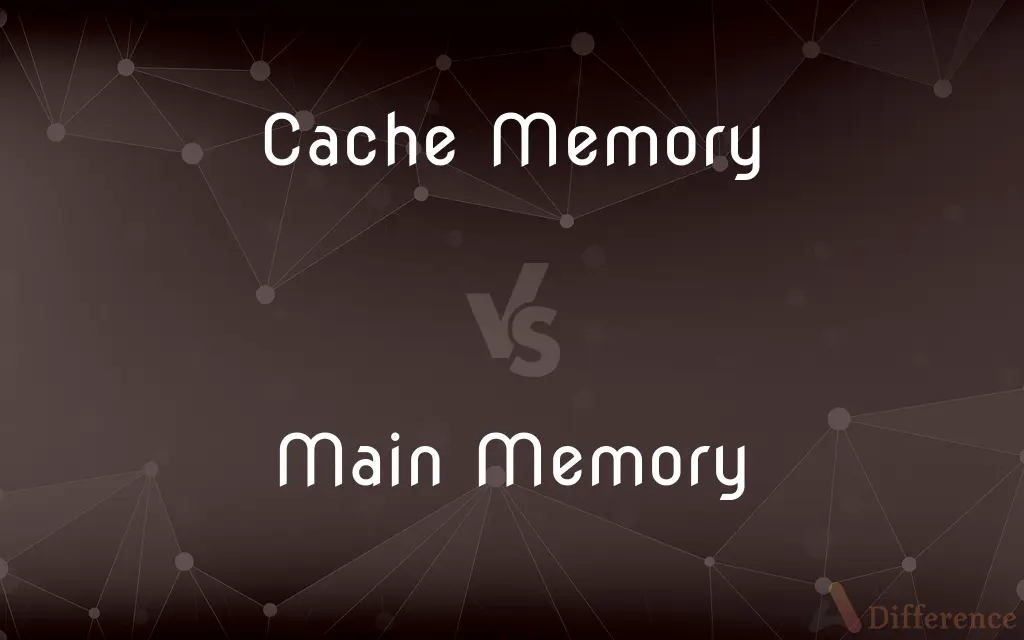Cache Memory vs. Main Memory — What's the Difference?
By Tayyaba Rehman — Published on November 23, 2023
Cache Memory is high-speed volatile memory providing high-speed data access to the processor and stores frequently used computer programs, applications, and data. Main Memory provides space for the operating system, applications, and data in current use.

Difference Between Cache Memory and Main Memory
Table of Contents
ADVERTISEMENT
Key Differences
Cache Memory is a type of volatile computer memory that provides high-speed data access to the processor and improves the speed and performance of the computer. Main Memory, often referred to as RAM (Random Access Memory), is also volatile and provides the space that allows the operating system, applications, and data in current use to be kept readily accessible.
The primary role of Cache Memory is to store program instructions and data that are used repeatedly in the operation of programs or information the user may return to frequently. Main Memory, in contrast, can hold data and programs that are currently being used.
Cache Memory typically has less capacity compared to Main Memory but is faster. Its design is to bridge the speed discrepancy between high-speed CPU operations and slower main memory access. Main Memory offers a balance between size and speed and is substantially larger than cache.
The data most frequently used by the CPU can be stored in the Cache Memory as it is usually faster than the main memory. When the CPU needs to access data, it first checks whether the data is in the cache. If the required data is found in the Cache Memory, it's called a cache hit, but if not, it’s a cache miss, and the data is read from the Main Memory.
It's essential to understand that Cache Memory, due to its high speed, is more expensive than Main Memory. As a result, computers will often have a smaller amount of cache compared to main memory. Main Memory, being more affordable in comparison, is used to provide a larger memory space to handle the computer's ongoing operations.
ADVERTISEMENT
Comparison Chart
Speed
Very high speed
Slower than Cache Memory
Cost
More expensive per byte
Less expensive per byte
Size
Smaller capacity
Larger capacity
Purpose
Stores frequently accessed data and instructions
Holds data & programs in current use
Dependency
Works with CPU for faster data access
Works with the entire computer system
Compare with Definitions
Cache Memory
Memory that stores commonly used instructions to speed up computer processes.
High-end gaming systems use advanced Cache Memory to enhance gameplay.
Main Memory
A larger, yet slower, type of volatile computer memory compared to cache.
The software requires a lot of Main Memory to operate smoothly.
Cache Memory
A bridge to compensate for the speed gap between main memory and CPU operations.
Having a larger Cache Memory in your computer can significantly boost operational speeds.
Main Memory
The primary storage area for data and programs in current use.
The computer was lagging because the Main Memory was almost full.
Cache Memory
The immediate memory layer assisting the processor.
The Cache Memory helps in reducing the time the CPU spends accessing the main memory.
Main Memory
Often referred to as RAM, it's a volatile storage in a computer.
Upgrading the Main Memory can significantly improve computer performance.
Cache Memory
A smaller, faster type of volatile computer memory that provides high-speed data access to the processor.
The CPU retrieves frequently used data from the Cache Memory for faster processing.
Main Memory
A critical component for computer operations, influencing speed and multitasking capability.
For heavy multitasking, having a substantial amount of Main Memory is beneficial.
Cache Memory
A storage area holding the data most frequently used by the CPU.
When the system boots up, certain instructions are loaded into Cache Memory for quick access.
Main Memory
The memory space where the operating system, applications, and data files reside while in use.
She installed an additional 16GB of Main Memory to her laptop for her design software.
Common Curiosities
Is Main Memory the same as RAM?
Yes, Main Memory is often referred to as RAM (Random Access Memory).
Why is Cache Memory faster than Main Memory?
Cache Memory is designed to be faster to bridge the speed gap between the CPU and Main Memory.
If Cache Memory is faster, why not have all memory as cache?
Cache Memory is much more expensive and has a smaller capacity compared to Main Memory.
How do Cache Memory and Main Memory work together?
Cache Memory stores frequently used data from Main Memory for rapid access by the CPU.
Can I upgrade the Cache Memory in my computer?
Typically, no. Cache Memory is integrated into the CPU, while Main Memory (RAM) can be upgraded.
Do all computers have both Cache Memory and Main Memory?
Yes, all modern computers have both Cache Memory and Main Memory.
Why is Main Memory volatile?
Both Cache Memory and Main Memory are volatile, meaning they lose their data when power is turned off.
Does Cache Memory affect gaming performance?
Yes, a faster or larger Cache Memory can improve gaming performance by reducing data access times.
What's the primary function of Cache Memory?
Cache Memory stores frequently accessed data for quick access by the CPU.
What happens when the CPU can't find data in Cache Memory?
It's a cache miss, and the CPU retrieves the data from the Main Memory.
Which memory is accessed first by the CPU?
The CPU accesses Cache Memory first, and if data isn't found, it accesses the Main Memory.
How can I see the amount of Main Memory in my computer?
On most systems, you can check system properties or settings to see the Main Memory (RAM) size.
Is more Main Memory always better?
More Main Memory can improve performance up to a point, but other factors, like CPU speed and storage, also play roles.
Can a computer function without Main Memory?
No, Main Memory is essential for a computer's operation.
Do smartphones also have Cache Memory and Main Memory?
Yes, smartphones also use Cache Memory for the CPU and Main Memory for running applications.
Share Your Discovery

Previous Comparison
Have To vs. Want To
Next Comparison
Could You vs. Would YouAuthor Spotlight
Written by
Tayyaba RehmanTayyaba Rehman is a distinguished writer, currently serving as a primary contributor to askdifference.com. As a researcher in semantics and etymology, Tayyaba's passion for the complexity of languages and their distinctions has found a perfect home on the platform. Tayyaba delves into the intricacies of language, distinguishing between commonly confused words and phrases, thereby providing clarity for readers worldwide.












































